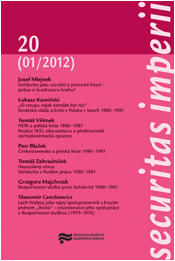Lech Wałęsa jako tajný spolupracovník s krycím jménem „Bolek“ – rekonstrukce jeho spolupráce s Bezpečnostní službou (1970–1976)
Lech Walesa as a Secret Collaborator Code-Named „Bolek“ – A Reconstruction of his Cooperation with the Security Service (1970–1976)
Author(s): Sławomir CenckiewiczSubject(s): Politics, Security and defense, Post-War period (1950 - 1989), Socio-Economic Research
Published by: Ústav pro studium totalitních režimů
Keywords: Lech Wałęsa; secret services; Poland
Summary/Abstract: This study, which is based on quoted archive materials, maps the cooperation of the leading representative of the Solidarity trade union movement Lech Walesa with the Polish Security Service (the SB secret police) in 1970–1976, the period of Solidarity’s foundation. Its introductory section sums up briefly Walesa’s biography, with an emphasis on the most significant aspects of his public engagement, from his participation in the strike movement in December 1970 and subsequent first arrest by the SB to his election as president and his haul of state and international awards. The next part attempts to find an answer to the question: Who was hidden behind the code-name agent „Bolek“? It contends that it is possible to reach a conclusion, despite the disappearance of several SB documents in the years 1992–1995; on the basis of an analysis of preserved evidential documents of the 3rd department of the voivode (regional) leadership of the Milicja Obywatelska (Citizens’ Militia) in Gdansk, an explanation of the rules of the secret police agency evidence, and other information, the SC (secret collaborator) „Bolek“ is identified as Lech Walesa. Passages are quoted from other preserved documents in which his controllers appraise the activities of SC „Bolek“, as are fragments from reports, mainly from 1971, which SC „Bolek“ delivered to the secret police and which featured, among other things, information on the situation in the workers’ movement and on concrete individuals. The following section maps out an answer to the question: What kind of a collaborator was the SC code-named „Bolek“? This is considered in the context of the fact that in the period 1971–1972 he was an active collaborator who supplied the secret police with valuable information and received financial rewards for doing so. Gradually, however, his activities abated, as „Bolek“ began to become involved in the trade union movement and to criticize the situation in Poland in 1974–1976. Despite warnings from his controllers, he continued in those activities and in 1976 was released from the employment of the SB, while also being excluded from the network of agents over his unwillingness to cooperate. The study concludes with the assertion that while the historical role that Lech Walesa played in the formation and activities of the Solidarity independent trade union movement from August 1980 saw him become part of the Polish national pantheon, he should not be excepted from objective historical appraisal. The author writes that carrying out such appraisals of publicly active figures is the duty of historians and the opportunity to access them is the right of citizens. He points also to the fact that while Lech Walesa has always strongly denied being an agent and is the holder of a negative court screening, he has never carried out his threat to sue historians who publish untrue information about him.
Journal: Securitas imperii
- Issue Year: 2012
- Issue No: 20
- Page Range: 94-117
- Page Count: 24
- Language: Czech

